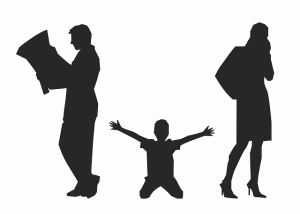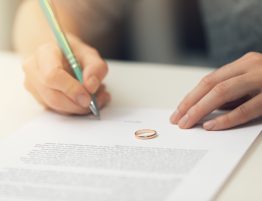
When a married couple gets a divorce, the effects spread beyond the immediate family and impact the relationships that each spouse has with extended families, in-laws, and mutual friends. A marriage is a union of two families and each spouse builds relationships with their in-laws over the course of the marriage. A divorce can complicate or even end these relationships, and if the couple has children, dealing with these relationships post-divorce can be even more difficult. Relationships with in-laws and mutual friends can become awkward or fraught with tension, but it is important to keep these relationships civil for the sake of your family and children.
The following tips will help you handle family, in-law, and mutual friend relationships after a divorce.
Impact of Divorce
The impacts of a divorce are many as ending a marriage ends the legal status it comes with, causing you to make changes in your living situation, tax status, medical insurance, and more. These issues will be handled in court, such as division of assets and child custody.
The other major change after a divorce is that the emotional, mental, and physical ties between you and your spouse are ended. This can also affect other relationships that were built during the marriage, such as those with family and friends. You may not notice until after the divorce is final that so many of these relationships were a part of your marriage as you and your ex-spouse had a life built with traditions that included family and friends. Divorce can disrupt these relationships and create voids in your social life.
Keeping Contact with In-Laws

In some divorce scenarios, couples may desire little to no contact with each other or their former in-laws. However, this cannot be accomplished in all scenarios, especially when children are involved. Sometimes in-laws may take sides in a divorce which can make these relationships contentious or awkward. Your in-laws may also be affected by the change in relationship as they are used to seeing you and your children at family gatherings.
Divorcing couples with children must remain in contact for the child’s sake and in-laws including grandparents should stay involved in the children’s lives. It is important to put any animosity or differences aside to teach your children the importance of maintaining healthy family relationships.
Visitation from Grandparents
Grandparents have a legal privilege to see their grandchildren according to Illinois state law. This means that if the grandparents are denied visits with their grandchildren, they can petition for visitation through the court system. It is best for everyone involved to set up regular visitation times for the grandparents to see their grandchildren instead of going through the legal mess that can arise from denying these visits. This way, everyone can be involved in your children’s lives.
Mutual Friendships
Your divorce will inevitably affect some of the mutual friendships you have with your ex. Over the course of a marriage, spouses share friends with whom they may engage in activities like dinner dates and vacations. After the divorce, the dynamic with your mutual friends will shift which can make everyone involved uncomfortable.
These relationships become especially difficult if there is animosity between you and your ex. This may cause mutual friends to take sides or drop out of your lives as remaining neutral may be too much.
Post-Divorce Relationship with Your Ex
The most complicated relationship to figure out is your relationship with your ex moving forward. The conditions surrounding your divorce will largely impact this relationship.
Remaining friends with your ex after a divorce may not be possible, especially if there is animosity or there was abuse in the relationship. Trying to keep a friendship only increases the possibility for more bad behavior. Even when the split is amicable, changing the relationship into a friendship may not be the best idea.
If you and your ex have children, you will have to keep some sort of relationship for the benefit of your children. You will need to communicate with your ex regarding parenting time, medical issues, and school events. It is best to remain cordial to keep the animosity away from your children and if this is too difficult, arrange visitation and drop offs so there is as little contact between you and your ex as possible.
How to Survive Changing Relationships After a Divorce
As discussed above, there is very little you can do about the shift in the dynamics of your relationships that is sure to occur after a divorce. However, these changes do not have to be negative. The following tips will help you navigate these relationships in a way that benefits you and your children.
- Former in-laws: If you want to maintain relationships with your in-laws, keep in mind that it may not work out. You should be prepared for this possibility and try not to blame anyone if these relationships cannot be saved. You should also consider that your in-laws will still want to maintain their relationships with your children. It is important to allow your children to continue having relationships with their grandparents, aunts, uncles, and cousins while holding your feelings aside. These relationships will help your children cope with the experience.
- Mutual friends: Maintaining mutual friendships built during your marriage can be very difficult. There is no real consensus on how to manage this and you may be surprised how your friends choose sides, or if they remain in either of your lives. You should be ready for these relationships to sort themselves out organically.
- Relationship with your ex: Maintaining a friendly relationship after a divorce can be difficult, especially if there is animosity or the decision to divorce was not mutual. The best thing to do is to try and disengage with the feelings you have towards your spouse so you can communicate amicably, especially for the sake of your children. Emotional detachment is healthy as it will help prevent hurt feelings or feelings of rejection. Maintaining a healthy relationship with your ex is also beneficial for your children.
Healing After the Divorce
Divorce can be a messy and stressful situation and many of the people you know, including family, in-laws, and friends, will also be reeling from the impact of your divorce. While it can be difficult to handle the loss and rejection of in-laws and mutual friends, it is important to remember that your family and friends will continue to stand by you and provide support. There is also a chance that the resentment and awkwardness created by your divorce will fade with time and you may regain some of those relationships after everyone has had time to heal and reflect. The important thing is to keep your expectations realistic and be prepared for some of these relationships to end or at least be put on hold.
It also helps to be ready to forgive. You can grieve your losses and heal on your own while separating yourself from those who are causing you pain or anger. This will then allow you to reach a place of forgiveness and put you in control of these relationships so you can decide whether to pursue them again at a later date or not.
Keep your Children’s Best Interest in Mind
Divorcing couples often get tied up in their own differences and their relationships with family, friends, and in-laws, but you cannot lose sight of what is in the best interest of your children. Maintaining contact between your children and their family, including their grandparents, is beneficial for their mental and emotional health. When divorcing couples and their parents put the best interest of the children first, it becomes much easier to work out personal differences and come up with a visitation schedule.
Work with a Divorce Attorney
Divorce is never easy and relationships with in-laws after a divorce can be very difficult to manage. However, by putting the best interest of your children first, you can more easily work out your differences with your in-laws to maintain healthy relationships for the sake of your children.
If you are going through a divorce and need help from a divorce attorney, contact us at Allen Gabe Law, P.C. at (847) 241-5000, Ext 121. Our divorce lawyers have the knowledge and experience to settle divorces while keeping the best interest of your children in mind.







